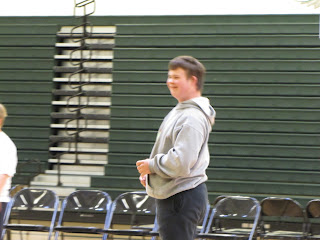People with Special Needs need and want to participate sports and athletics. Where can they go? One great organization that supports people with Down Syndrome and other disabilities is Special Olympics.
Our family is blesses to be involved in Special Olympics. What an awesome program, not only to give our son a chance to participate in team and individual sports, but it is a place for camaraderie, learning and growth.
Special Olympics Mission
The Special Olympics mission remains as vital today as it did when the movement was founded in 1968. Through the power of sport, Special Olympics strives to create a better world by fostering the acceptance and inclusion of all people.
Check out the Special Olympics web site HERE.
Different Abilities, Not Disabilities
Attitudes and perceptions matter -- because they affect how people treat each other. Do they treat each other with respect and dignity? Or do they cling to misperceptions and stereotypes?
Special Olympics is raising awareness about the abilities of people with intellectual disabilities. Through sports, we showcase the skills and dignity of our athletes. We also bring together communities to see and take part in the transformative power of sports.
We know the odds our athletes must overcome and the barriers they face every single day. We see this at training events and competitions as our athletes push to beat their personal bests -- and exceed them. Their stories and successes inspire us all.
We believe in a world where there are millions of different abilities but not disabilities. And we're spreading this message everywhere - at big Special Olympics events and small ones.
A spectator at the World Summer Games in Athens, Greece, said he was surprised to see the talents of our athletes. He’d hadn't known or seen many people with disabilities before. But, in his words, “the more you see, the more you believe."
What Differences?
Sports can also change attitudes by bringing people together -- regardless of ability or disability -- in a very special way. A typical Unified Sports® game unites people with and without intellectual disabilities on the same team.
After one Unified Sports event at a school in Lebanon, a student was asked about differences she saw among the teammates. “What do you mean? What differences?” she said. “We are all human -- this is what matters."
Important Work Ahead
Yet, ours is an urgent mission. That’s because people with intellectual disabilities are among the most vulnerable in the world.
They are often ignored, neglected and excluded from schools and society. Special Olympics may be the only place where people with intellectual disabilities get the chance to become part of their communities and develop belief in themselves.
These programs open a gateway for our athletes to achieve empowerment and acceptance. We know it works when we hear that a young Special Olympics athlete raised in an institution in India is visited and congratulated by government officials after earning a gold medal at World Games. When a U.S. city posts a highway sign boasting that the town is the home of a Special Olympics runner. And when a new world of acceptance is opened to a Cote d'Ivoire athlete following a successful competition: "I have become the star of my neighborhood and our church, I, the one who used to be rejected...!"
There are millions more athletes we hope to reach -- and millions more lives we are working to change for the better.
Different Abilities, Not Disabilities
Attitudes and perceptions matter -- because they affect how people treat each other. Do they treat each other with respect and dignity? Or do they cling to misperceptions and stereotypes?
Special Olympics is raising awareness about the abilities of people with intellectual disabilities. Through sports, we showcase the skills and dignity of our athletes. We also bring together communities to see and take part in the transformative power of sports.
We know the odds our athletes must overcome and the barriers they face every single day. We see this at training events and competitions as our athletes push to beat their personal bests -- and exceed them. Their stories and successes inspire us all.
We believe in a world where there are millions of different abilities but not disabilities. And we're spreading this message everywhere - at big Special Olympics events and small ones.
A spectator at the World Summer Games in Athens, Greece, said he was surprised to see the talents of our athletes. He’d hadn't known or seen many people with disabilities before. But, in his words, “the more you see, the more you believe."
Won't you support Special Olympics?
Be gentle.








No comments:
Post a Comment
Love reading your thoughts. Please leave us a comment.